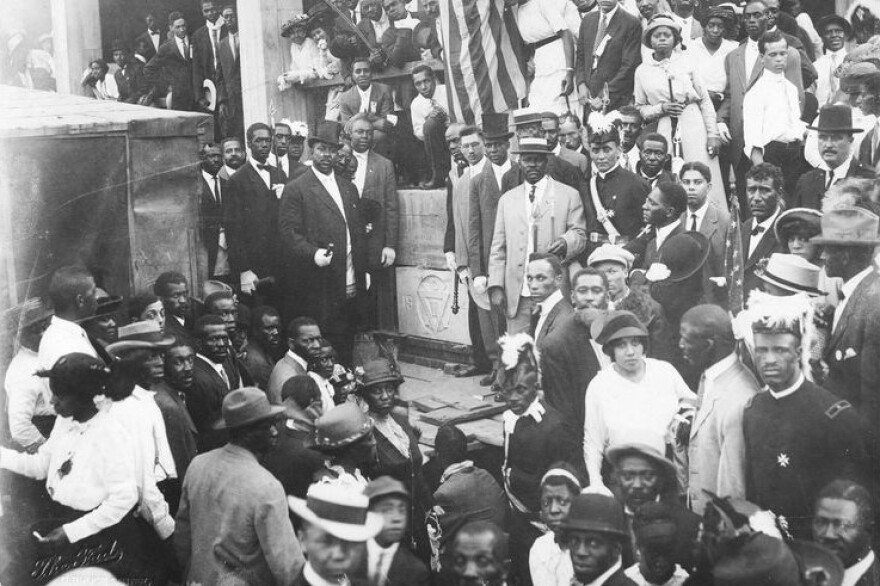When it comes to the history of the African American community in Kansas City, almost everyone knows the big names — people like jazz great Charlie Parker or baseball legend Buck O’Neil, who are both memorialized in countless ways around the metro.
“But that’s just a small number of the people who worked together and individually to build life and culture for Black Americans,” said Carmaletta Williams, executive director of the Black Archives of Mid-America in Kansas City.
It’s the lesser-known Kansas Citians who frequently fall through the cracks of historical record, even if they deserve “to be recognized, to have their life's work acknowledged,” she said.
To do that, the Archives has teamed up with the Kansas City Public Library, the Local Investment Commission, and the Bruce R. Watkins Cultural Center to create a 44-page collection featuring the stories of educators, medical workers, entrepreneurs, civic leaders and more — right alongside the lives of Bird and Buck.
“I hope that their lives are illuminated so that people can see how bright and brilliant and hard-working these people were,” Williams said.
How the Black Archives Of Mid-America started
For her, one of those people is Horace Peterson III, who was born in Tulsa and moved to Kansas City, Missouri, as a child.
“Horace Peterson started collecting buttons and brochures and storing them in the trunk of his car and telling his friends when he was in high school that he was going to open a Black museum,” Williams said.
At the time, they thought he was crazy but, in 1974, Peterson founded the Black Archives of Mid-America, which Williams now leads.

Brent Schondelmeyer has been a part of the Kansas City Black History project since it started in 2010.
In its first iteration, the project featured two sets of biographies: one of national figures like Frederick Douglass, Malcolm X, and former President Barack Obama, and another featuring local people like equestrian Tom Bass and journalist Lucile Bluford.
In subsequent years, the project has focused exclusively on people with a connection to Kansas or Missouri.
In the acknowledgements of this 12th edition of their work, which can be downloaded online and is available for free at most Kansas City Public Library locations, the research group noted they wanted to do something special for two reasons.
“This book is being published at a time when our community comes to grips with enduring patterns of racial injustice. And it coincides with the bicentennial of Missouri statehood in 1821 — an event that was itself, in part, a concession to the supreme racial injustice of slavery,” they wrote.
Several prominent and current Kansas Citians also contributed to this year's collection, including poet Glenn North, executive director of the Bruce R. Watkins Cultural Center, who wrote and recorded "I Sing Their Names" for the occasion.
“These are stories of people who get up everyday and aspire for something for themselves or for their community,” Schondelmeyer said.
As more and more people have learned about the project over the years, community members have approached Schondelmeyer with the names of people they think should be included.
“This is a project that could be done in any community,” he said, and it became a project the Kansas City community at-large could participate in.
An abundance of achievers
Not every suggestion will make it into the collection, though, which Jeremy Drouin knows all too well.
Drouin is the manager of the Missouri Valley Special Collection at the Kansas City Public Library, which, along with the Black Archives, is responsible for the bulk of researching and writing the biographies.
“There’s a lot of people we’ve had to leave out,” Drouin said, “because we didn’t have enough information to have a complete bio.”
Drouin’s team, and the team at the Black Archives, depend heavily on obituaries and clippings from magazines and newspapers, especially the Kansas City Call.
"Photos are particularly hard to find," Drouin explained. “That takes some sleuthing on our end.”

The partnership has drawn from the resources of at least 28 different archives around the country.
Drouin, a historian who has worked in the department for 20 years, said he likes that the project gives him the opportunity to learn about new people from the past, like Leona Pouncey Thurman.
Thurman graduated from Howard University School of Law in 1949, and was the first African American woman to practice law in Kansas City and the first Black woman admitted to the Jackson County Bar.
“I think I like (these stories) because their contributions were great, but they also gave back to the community,” Drouin said.
Drouin’s team is also working with local educators and the Kansas City Social Studies Consortium to develop several lesson plans related to the racial struggle here. Those plans will be available soon on the project’s website, KCBlackHistory.org.
These stories of remarkable African Americans are important for people of all backgrounds to learn, said the Archives' Williams, especially in a city that has been heavily segregated since the early 20th century.
“We think of white Americans and Black Americans, and we think of Latinx folks,” she said, “but we live together and we share this space … and so we have to recognize that the world is bigger. Our experiences are bigger than just our bubble.”






